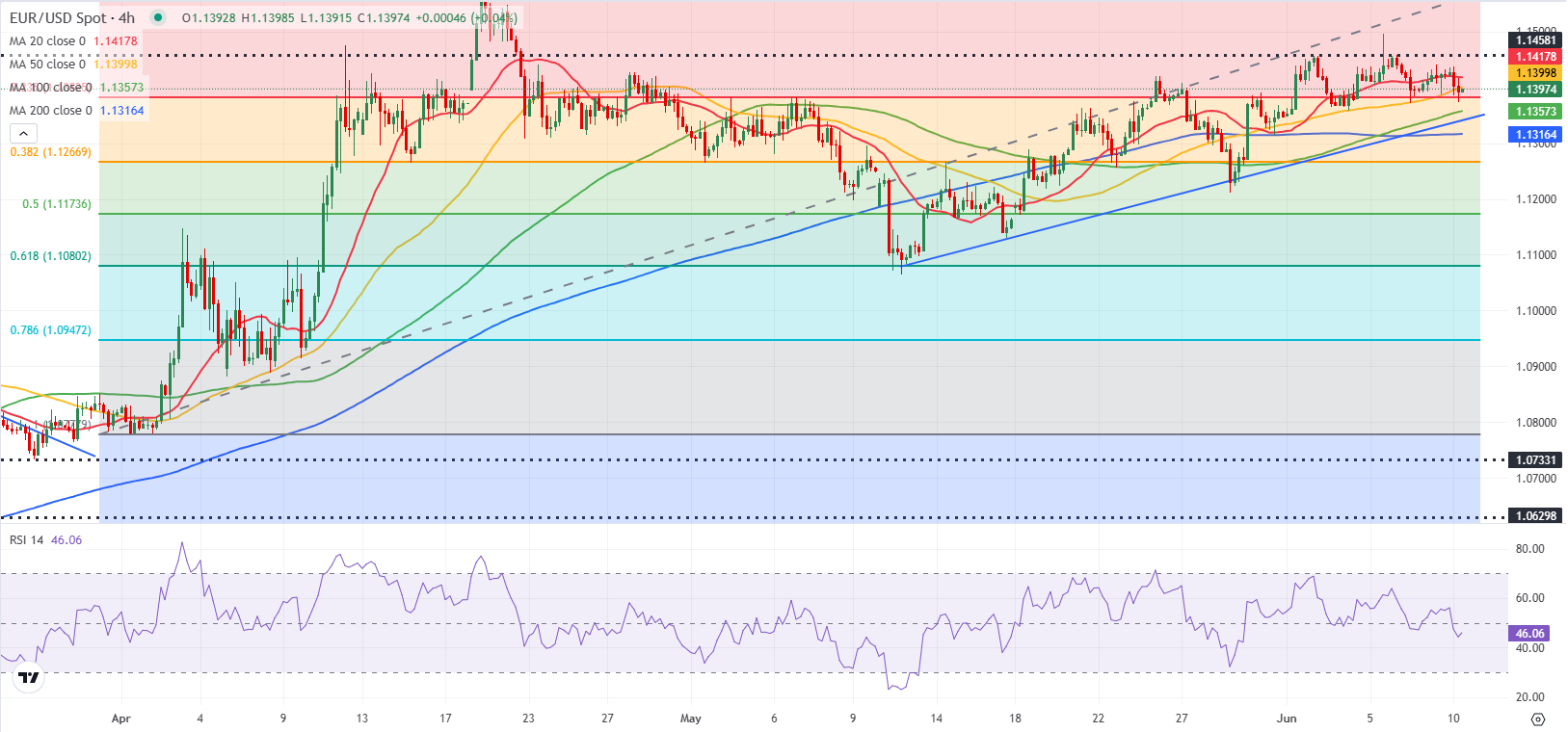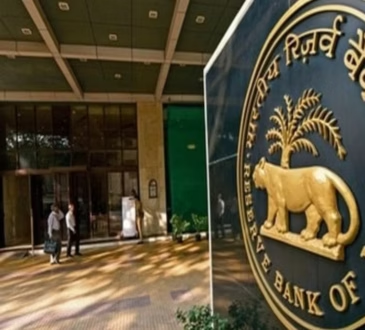- EUR/USD loses traction and trades slightly below 1.1400 on Tuesday.
- US-China trade negotiations are set to continue in London.
- The pair could gather bearish momentum if 1.1360-1.1350 support fails.
EUR/USD stays on the back foot in the European morning on Tuesday and trades slightly below 1.1400 after posting marginal gains on Monday. Growing optimism about the United States (US) and China resolving the trade dispute helps the sentiment around the US economic outlook improve and supports the US Dollar (USD).
Euro PRICE Today
The table below shows the percentage change of Euro (EUR) against listed major currencies today. Euro was the weakest against the US Dollar.
| USD | EUR | GBP | JPY | CAD | AUD | NZD | CHF | |
|---|---|---|---|---|---|---|---|---|
| USD | 0.22% | 0.54% | 0.07% | 0.11% | 0.19% | 0.18% | -0.01% | |
| EUR | -0.22% | 0.33% | -0.18% | -0.08% | -0.01% | -0.04% | -0.21% | |
| GBP | -0.54% | -0.33% | -0.55% | -0.41% | -0.33% | -0.37% | -0.53% | |
| JPY | -0.07% | 0.18% | 0.55% | 0.07% | 0.09% | 0.03% | -0.16% | |
| CAD | -0.11% | 0.08% | 0.41% | -0.07% | 0.06% | 0.05% | -0.12% | |
| AUD | -0.19% | 0.00% | 0.33% | -0.09% | -0.06% | -0.01% | -0.20% | |
| NZD | -0.18% | 0.04% | 0.37% | -0.03% | -0.05% | 0.00% | -0.17% | |
| CHF | 0.00% | 0.21% | 0.53% | 0.16% | 0.12% | 0.20% | 0.17% |
The heat map shows percentage changes of major currencies against each other. The base currency is picked from the left column, while the quote currency is picked from the top row. For example, if you pick the Euro from the left column and move along the horizontal line to the US Dollar, the percentage change displayed in the box will represent EUR (base)/USD (quote).
The trading action in financial markets remained subdued on Monday as investors refrained from taking large positions, while waiting for headlines coming out of the US-China trade talks.
Although no official statement was released after the first day of negotiations, the Wall Street Journal reported that US President Donald Trump gave his representatives, led by Treasury Secretary Scott Bessent, room to lift export controls on a variety of Chinese products. The sides are expected to continue talks in London on Tuesday.
Meanwhile, European Central Bank (ECB) policymaker Francois Villeroy de Galhau said on Tuesday that they will remain pragmatic going forward on rates. This remark, however, failed to help the Euro gather strength.
The economic calendar will not offer any high-impact data releases later in the day. Hence, investors will remain focused on news surrounding the US-China trade relations.
In case trade talks lead to a deal, the USD could gather strength against its rivals with the immediate reaction and weigh on EUR/USD. On the other hand, investors could grow anxious if there are no new positive developments on the issue. In this scenario, the USD could come under renewed selling pressure.
EUR/USD Technical Analysis

The Relative Strength Index (RSI) indicator on the 4-hour chart retreated slightly below 50 and EUR/USD closed the last two 4-hour candles below the 20-period Simple Moving Average (SMA), reflecting a loss of bullish momentum.
The immediate support for EUR/USD is located at 1.1380 (Fibonacci 23.6% retracement of the latest uptrend) before 1.1360-1.1350 (100-period SMA, ascending trend line) and 1.1310-1.1300 (200-period SMA, static level). Looking north, resistances could be seen at 1.1450 (static level), 1.1500 (static level, round level) and 1.1575 (April 21 high).
Euro FAQs
The Euro is the currency for the 19 European Union countries that belong to the Eurozone. It is the second most heavily traded currency in the world behind the US Dollar. In 2022, it accounted for 31% of all foreign exchange transactions, with an average daily turnover of over $2.2 trillion a day.
EUR/USD is the most heavily traded currency pair in the world, accounting for an estimated 30% off all transactions, followed by EUR/JPY (4%), EUR/GBP (3%) and EUR/AUD (2%).
The European Central Bank (ECB) in Frankfurt, Germany, is the reserve bank for the Eurozone. The ECB sets interest rates and manages monetary policy.
The ECB’s primary mandate is to maintain price stability, which means either controlling inflation or stimulating growth. Its primary tool is the raising or lowering of interest rates. Relatively high interest rates – or the expectation of higher rates – will usually benefit the Euro and vice versa.
The ECB Governing Council makes monetary policy decisions at meetings held eight times a year. Decisions are made by heads of the Eurozone national banks and six permanent members, including the President of the ECB, Christine Lagarde.
Eurozone inflation data, measured by the Harmonized Index of Consumer Prices (HICP), is an important econometric for the Euro. If inflation rises more than expected, especially if above the ECB’s 2% target, it obliges the ECB to raise interest rates to bring it back under control.
Relatively high interest rates compared to its counterparts will usually benefit the Euro, as it makes the region more attractive as a place for global investors to park their money.
Data releases gauge the health of the economy and can impact on the Euro. Indicators such as GDP, Manufacturing and Services PMIs, employment, and consumer sentiment surveys can all influence the direction of the single currency.
A strong economy is good for the Euro. Not only does it attract more foreign investment but it may encourage the ECB to put up interest rates, which will directly strengthen the Euro. Otherwise, if economic data is weak, the Euro is likely to fall.
Economic data for the four largest economies in the euro area (Germany, France, Italy and Spain) are especially significant, as they account for 75% of the Eurozone’s economy.
Another significant data release for the Euro is the Trade Balance. This indicator measures the difference between what a country earns from its exports and what it spends on imports over a given period.
If a country produces highly sought after exports then its currency will gain in value purely from the extra demand created from foreign buyers seeking to purchase these goods. Therefore, a positive net Trade Balance strengthens a currency and vice versa for a negative balance.




